When we moved to our farm, one of the top items on our wishlist was finally adopting a dog. At the time, we thought mostly about what type of dog we wanted, rather than which might be the best dog breed for a farm.
I think that no matter where you live, you and your family should be the first consideration when adding a dog to your family. But your environment is an important factor, so here are my suggestions for the best dog breeds for a farm. I welcome your suggestions as well!
IN THIS POST:
- Mutts as farm dogs
- Best working breeds for farms
- Golden retrievers as farm dogs
- Jack Russell terriers as farm dogs
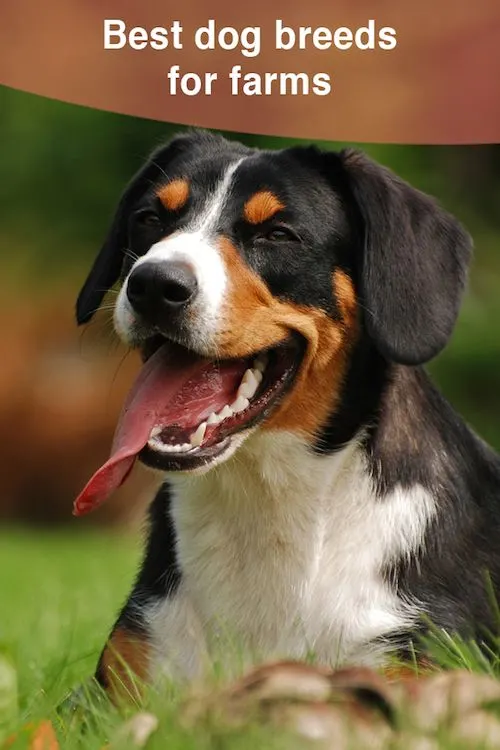
What are the best farm dogs?
Mutts are the most common farm dogs
Given the name of this website, I absolutely must start this post with mixed breed dogs. For me, mutts are the quintessential farm dog.
Historically, I’d say most farm dogs were mutts, as dogs from neighbouring farms met up and made new puppies. Today, with higher rates of spaying and neutering and less wandering, this situation is hopefully less common. But mutts are still the perfect fit for a farm.
Mutts come in all shapes and sizes, all personalities and attitudes. You can find a mutt that’s a good match to your farm and the type of activities you’re going to be doing with your dog.
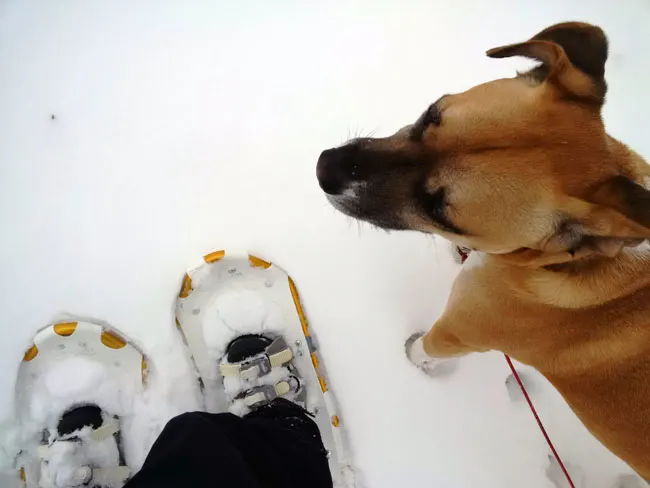
Living on a farm will bring out different aspects of a dog’s personality. You may learn something about your mutt’s breed. For example, Baxter’s rescue group classified him as a boxer-lab. However, once at the farm, we saw how he followed his nose and heard him howl, so we now think he’s likely part hound too.
Part of the joy of living on a farm is sharing the experience with my family. Seeing my mutt following the tractor, smelling the smells and enjoying time outdoors is really rewarding.
Working breeds as farm dogs
Dogs can be an invaluable resource for farmers. Herding and protecting livestock are all easier with a dog’s help.
Working dogs are highly specialized and have been carefully bred for centuries to work successfully with both livestock and humans. On farms, dogs work with sheep, cows, goats, chickens, horses and numerous other animals.
Common working breeds for farms
Common working dog breeds that make good farm dogs are collies, border collies, sheepdogs, blue heelers, Australian cattle dogs, Australian shepherds (Aussies) and Entlebucher mountain dogs.
There’s also the category of livestock guardian dogs (LGD), which includes great Pyrenees, maremma Sheepdog, akbash, Anatolian shepherd, kangal, komondor and Spanish mastiff. These breeds are all very intelligent.
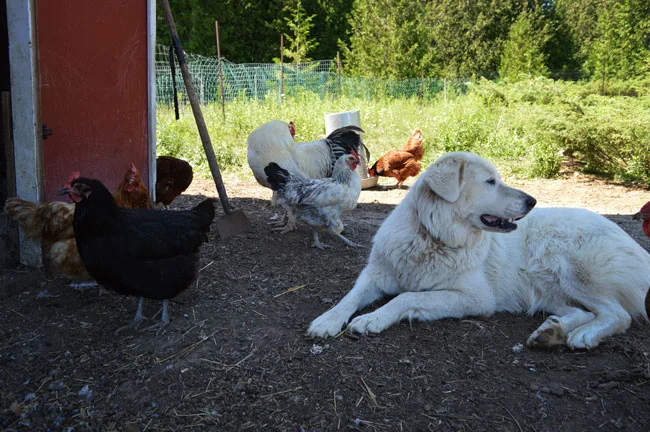
These dogs are driven to work. Herding dogs want to herd and guard dogs want to protect. But along with their careful breeding, working dogs require training in order to be successful in their roles. It’s important that farmers fulfill their dogs’ needs.
Pet dogs on farms
The most common type of dog you’ll find on farms is the same dog that you’ll find anywhere else. The companion dog. These dogs are pets whose primary job is to hang out with the family and enjoy life in the country.
On a farm, you want a dog who is suited to be and enjoys being outdoors. This means that the dog can tolerate various different types of weather, from hot, humid summers to bitter, cold winters. Though, I’m not advocating that your pet dog spend all his time outside fending for himself.
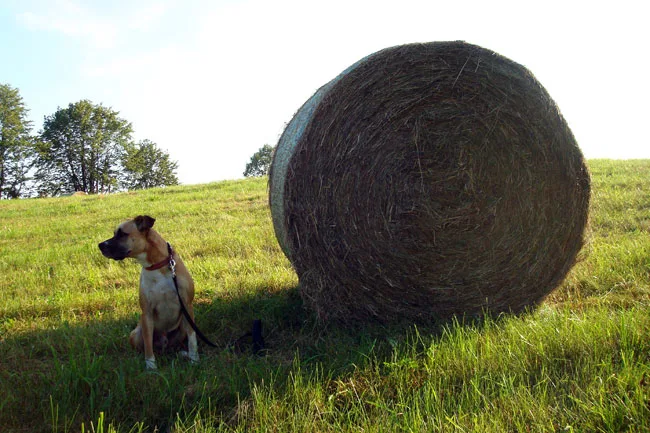
The dog’s size and coat type
A dog’s size, coat and facial structure are all important things to consider. Labs, other retrievers, spaniels and German shepherds are some of the breeds that might be a good fit for your farm.
Animals are part of farm living, whether you have your own livestock or your property receives regular visits from the local wildlife. This situation can be challenging for some dogs who have higher scent tracking or prey drives, like hounds, beagles or some terriers.
Be prepared that you may have to invest some extra effort in training and monitoring your dog to help him adjust to all of the distractions that a farm brings and to train your dog to stay on your property.
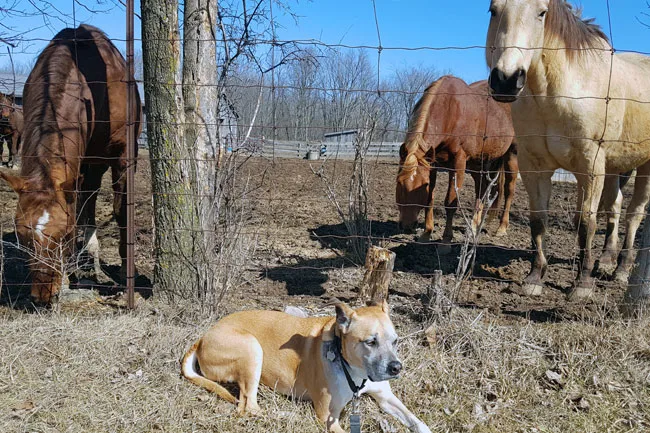
Are golden retrievers good farm dogs?
Yes, they can be. However, if you have a longer haired dog like a golden retriever, collie, poodle or even a schnauzer, your dog may require extra grooming due to your environment.
Farms come with lots of mud, dirt, long grass and weeds (including burrs), all of which can become tangled in your dog’s coat. As well, farms usually provide habitat for ticks, so a careful check of you and your dog every time you come inside is essential.
Are Jack Russell terriers good farm dogs?
They certainly can be!
I do feel like medium to large size dogs are best suited to farms. Bigger dogs can tromp through long grass, go for longer walks and deal with the local animals (domestic and wild) more easily than some smaller dogs. But Jack Russells and other terriers are agile and tough with a lot of energy. They might even catch rats and other pests.
For farms, it’s also critical to have a balance of energy. Farms usually come with big open spaces, which means your dog will have lots of room to run. But this lifestyle also comes with big equipment, animals and lots of work. Your dog needs to be able to be calm in this atmosphere and give you the time and space to take care of your farm.
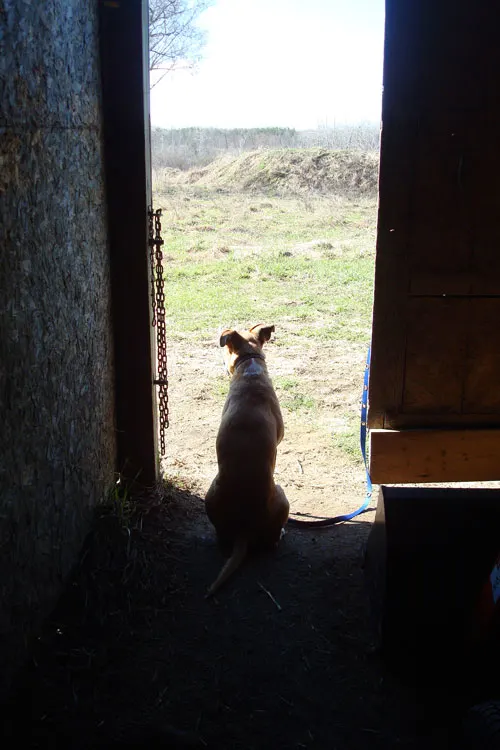
Farm dogs are as varied as the farms they live on. We know that big energetic dogs can live happily in tiny city apartments. And teeny toy breeds can thrive on large rural properties. Whatever characteristics your dog has, the best breed of dog for your farm is the one that lives best with your family.
Now I’d love to hear from the rest of you!
- Other farm dwellers out there, what is the best type of farm dog?
- Did you consider where you live when you were choosing your dog?
Let me know in the comments!
Related posts:
Julia Thomson is a blogger at Home on 129 Acres where she writes about her adventures of country living and DIY renovating. She and her family live on a 129-acre farm in Ontario, Canada.

Kashif Ur Rehman
Monday 7th of October 2019
As per my experience, I only recommend Bernese Mountain dog as a farm dog. I am with these dogs for nearly 10 years and they are perfect for farm work. Only a little training makes them able to perform basic functions and this is a plus benefit that I am getting. The good thing is their basic function in the earlier time was farming dogs.
Kim Chappell
Saturday 14th of September 2019
Nice article with useful information , thanks!
For the record -Australian Cattle Dogs, Blue Heelers, and Red Heelers are all the same breed. Tho some ACD can be trained to do herding, they are primarily “drovers” which means they push livestock- a trait that often makes them too hot to work with animals like sheep- as sheep are much easier to move than the thousand pound bulls- which the ACD was specifically bred to chase and bite to make move. ACD are very loyal dogs, and can be great around a farm as long as the dog has been trained not to harass the other farm animals. They do need to have something constructive to do, or they will get into mischief. These dogs can easily run five miles a day, every day. Many ACD prefer to live outside, and are wary of strangers.
The Livestock Guardian breeds usually live right out with the livestock, year round. They protect the livestock from both predators and humans.
Border collies, Australian Shepherds ( who actually are not from Australia, they originated in the Western United States), Collies, and German Shepherds usually prefer to live inside with their humans.
Julia T.
Monday 16th of September 2019
Thanks so much for the clarification. I appreciate your insights.